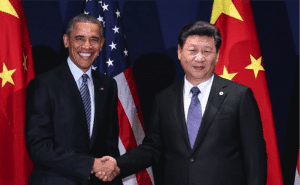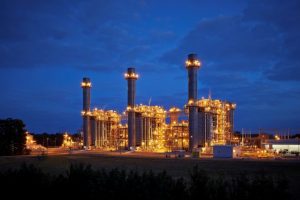A black cloud hung over the 2005 Ford Focus, which spewed fog from its tailpipe and money from its gas tank, a nod to Ford’s efforts to weaken emissions rules.
Consumer and environmental advocates drove the car to Ford’s headquarters Tuesday to deliver a petition signed by more than 250,000 people calling on the company to support existing standards.
“Ford and its trade association, the Alliance of Automobile Manufacturers, wasted no time rushing to Washington after President Trump’s election.
They sent him and his transition team their deregulation wishlist, which included the clean car standards,” Madeline Page, clean cars program coordinator for Public Citizen, told reporters.
“For the automakers, it was a dramatic u-turn. The car makers worked with the Obama administration to craft the rule in the first place.”
In April, the Environmental Protection Agency announced it would revise Obama-era fuel standards, following pressure from automakers, who face growing demand for gas-guzzling trucks and SUVs.
The protest aimed to highlight the astonishing hypocrisy of Ford and other U.S. automakers, who agreed to back stricter fuel standards after taking billions of dollars in loans and direct investments form the federal government as part of the 2009 auto bailout.

During the financial crisis, taxpayers loaned billions to struggling car companies.
Facing a precipitous drop in sales amid the economic downturn in 2008, General Motors and Chrysler — now Fiat Chrysler — asked Congress for a bailout, arguing that if the companies collapsed, it would put millions of Americans out of work. Taxpayers came to their rescue.
Congress invested more than $80 billion in General Motors and Chrysler and created incentivesto encourage the purchase of new cars. Taxpayers ultimately lost $9 billion on the investment, but according to the Center for Automotive Research, the bailout saved 1.5 million jobs.
While Ford did not appeal for a bailout like General Motors and Chrysler, it did borrow nearly $6 billion from the Department of Energy in 2009, money it used to retool its factories to build more fuel-efficient cars.
The loan helped keep the company afloat during the financial crisis, when banks were reluctant to issue cheap credit.

Under Obama, automakers pledged to back stronger fuel standards.
Following the bailout, car companies agreed to support stronger fuel standards in 2009 and again 2011, when President Obama announced automakers would have to achieve an average fleet-wide fuel economy of 54.5 miles per gallon by 2025.
The EPA would later evaluate the standards to determine if the targets were feasible, given the pace of technological progress. Car manufacturers — including Ford, GM and Fiat Chrysler — pledged not to challenge the new standards if they passed the evaluation.
In January 2017, the EPA completed its review, which found the standards were “feasible, practical and appropriate.” Independent analysis from the International Council on Clean Transportation came to the same conclusion.

Under Trump, automakers pushed to relax fuel standards.
Automakers didn’t waste any time breaking their promise. Just days after Donald Trump took office, the heads of Ford, GM and Fiat Chrysler met with the new president to urge him to revise the standards to “take into account consumer demand.”
Former Ford CEO Mark Fields said the standards could cost the United States one million jobs — more than the total number of people employed by the three automakers. Fields later said his warnings “resonated” with Trump.
Automakers also met with EPA chief Scott Pruitt who, in August, announced the agency would revisit the fuel standards, possibly overturning the Obama administration’s finding the standards were achievable. In April, Pruitt announced the results of that evaluation.
“The Obama Administration’s determination was wrong,” he said. Pruitt said his predecessor rushed the evaluation, “made assumptions about the standards that didn’t comport with reality, and set the standards too high.”

Faced with tougher standards overseas, automakers are building electric vehicles.
Undercutting the argument that the Obama-era fuel standards are too high is the fact that automakers are investing heavily in electric vehicles largely to keep pace with mandates overseas.
In the last year, China, India, Norway, France and the United Kingdom pledged to ban the future sale of gas-powered cars. In light of these announcements and rapidly falling prices for batteries, automakers are pouring money into electric vehicles and expecting to turn a profit.
GM aims to develop 20 new electric and fuel cell vehicles by 2023. A senior executive said the company is “committed to driving increased usage and acceptance of electric vehicles through no-compromise solutions that meet our customers’ needs.”
Ford plans to build 40 different models of electric vehicles by 2022, telling reporters, “we’re taking our mainstream vehicles, our most iconic vehicles, and we’re electrifying them.”
While Fiat Chrysler has no big plans to electrify its fleet, the company’s CEO, Sergio Marchionne, has said he believes the future will yield a surge of electric vehicles, particularly in China.
While automakers are investing in EVs, they are doing so reluctantly. GM CEOMary Barra has been critical of China’s plans to ban the sale of gas-powered cars, saying, “I think it works best when, instead of mandating, customers are choosing the technology that meets their needs.”
Before his ouster from Ford, Fields resisted investing in EVs, arguing that consumers aren’t interested in electric cars. Marchionne said Fiat Chrysler seeks to be “technology neutral,” delaying investing in electric cars until public policy or consumer demand render it necessary.

In the United States, automakers are all in on trucks and SUVs.
While U.S. automakers are developing electric cars to keep up with overseas demand, they are doubling down on trucks and SUVs in the United States. Low gas prices have driven demand for large, inefficient vehicles which, incidentally, are more profitable for automakers.
Ford is phasing out all but two sedans from its product line, pointing to “declining consumer demand and product profitability.”
GM also plans to cut production of sedans in favor of trucks and SUVs, while Fiat Chrysler no longer makes passenger cars in the United States due to their dwindling profitability.

U.S. automakers are talking out of both sides of their mouths.
On the one hand, U.S. automakers are pouring money into electric vehicles, recognizing that strict limits on pollution will drive consumer demand for EVs overseas.
At the same time, car manufacturers are fighting similar policies in the United States on the grounds that limiting pollution won’t allow them to keep up with consumer demand.
Instead of fighting the federal fuel standards they promised to support, U.S. automakers might lobby the government for more ambitious rules that bring the United States in line with China, India and Europe.
Car companies like to complain about the challenge of complying with the varying regulations issued by the EPA, the Department of Transportation and the state of California, which currently has the authority to set its own emissions rules and recently joined 16 states in suing the Trump administration for failing to implement Obama-era fuel standards.
Why not fight for a single, rigorous national standard that is consistent with regulations overseas?
Fuel standards would save money by helping drivers conserve fuel and save lives by cutting down on dangerous air pollution.
Families buying a car in 2025 would see fuel savings equal to paying a $1 less per gallon of gasoline, according to the Obama administration’s own estimate.
Fuel standards would also cut pollution from cars and light trucks in half by 2025. Because the transportation sector accounts for the largest share of U.S carbon emissions, the fuel standards are essential to meeting the goals of the Paris Agreement.

On some level, automakers understand this. Ford’s executive chairman, Bill Ford said, “ We know climate change is real and a critical threat, and we will continue to work with leaders around the world in support of ambitious global greenhouse gas reduction targets.”
Former GM chairman Rick Wagoner said the company wants to “proactively address the concerns posed by climate change.”
And yet, automakers have fought to allows cars and trucks to pollute more. It’s not just U.S. automakers.
Through their participation in the Alliance of Automobile Manufacturers, ostensibly climate-conscious car companies like Volvo, Volkswagen and Toyota have also pushed the Trump administration to ease limits on pollution and cast doubt on climate science.
Their well-publicized lobbying efforts have created a public relations problem. Nearly 70 percent of voters want to keep current fuel efficiency standards, including a plurality of Republicans. More than 60 percent are worried about climate change.
It’s why the Auto Alliance, which led the charge to weaken fuel standards, is backpedaling on its earlier lobbying efforts.
It’s why Barra wrote on LinkedIn that GM has “an absolute and unwavering commitment to improve fuel economy, reduce emissions and invest in technologies to drive an all-electric future.”
And it’s why, in a recent blog post, Ford executives insisted, “We support increasing clean car standards through 2025 and are not asking for a rollback.”
Advocates aren’t buying it. “Ford touts a green image and has pledged support for climate programs.
Its chairman, Bill Ford, proclaims climate change an urgent problem, and yet Ford is working with the Trump administration to undo the biggest protection program for climate on the books in this country,” Page said.
“On the one hand, they love to earn media praise for making clean car announcements, while at the same time they’re working to roll back the very standards that will actually ensure that we have clean air to breathe and a healthy climate for future generations.”
Jeremy Deaton writes for Nexus Media, a syndicated newswire covering climate, energy, policy, art and culture. You can follow him @deaton_jeremy.
Source: Nexus Media. Reproduced with permission.










